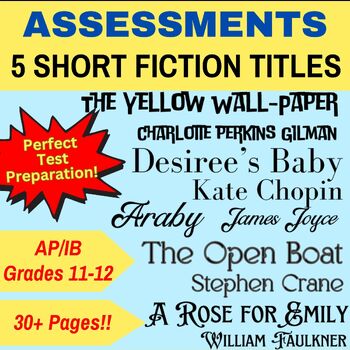Assessments for Short Fiction grades 11-12, AP/IB
- PDF
Description
All the assessments you need for your Short Fiction Unit!!
The featured texts are:
- “The Yellow Wall-Paper” by Charlotte Perkins Gilman
- “A Rose for Emily” by William Faulkner
- *“Desiree’s Baby” by Kate Chopin
- “The Open Boat” by Stephen Crane
- “Araby” by James Joyce
For each of the 5 texts, this resource contains:
- Text Excerpt
- Multiple Choice Quiz
- Stable Prompt Essay
- Answer Key
- Suggested Content for Essay
These resources are designed to assess your students’ understanding and interpretation of high level texts. The multiple choice assessment is designed in the AP Literature and Composition style, featuring complex questions regarding analysis, theme and vocabulary. This assessment works best for your AP Literature and Composition class or to challenge your advanced students in any of your classes. The standardized test-style essay prompt is modeled after the AP Literature and Composition #2 Stable prompt. The text excerpt is designed for students to use with the stable essay prompt for all titles except “Desiree’s Baby.” For “Desiree’s Baby” the text excerpt is designed to be used with the multiple choice quiz. For best results, use the AP Literature and Composition Essay #2 rubric when grading.
If you enjoyed this resource, please consider leaving feedback and following me on my platforms.
Happy reading and annotating!
Christine Varvaro
Secondary ELA with MsV





